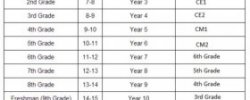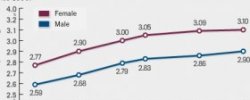In Sweden, the credit system is used to measure academic achievement. Sweden follows the ECTS system. Therefore, after the successful completion of full-time study (having passed the examinations), the student will have achieved 30 credit points (högskolepoäng), which is equivalent to 30 ECTS or 15 US credits. Degree programme students are automatically enrolled for full-time studies of 30 ECTS per term. In the Swedish system the students only take one course at a time. Students select courses so that they make up a full semester's study - see the example below. The important thing to remember is to choose courses that are given at different times during the semester so that you do not end up with four courses that all start in the middle of October. See the model below.
Important! International students must be admitted to full-time studies, or at least 30 ECTS per term, in order to obtain a residence permit for studies in Sweden by the Swedish Migration Agency (Migrationsverket). Therefore, being admitted to a single 7.5 or 15 credit course for an academic term will not suffice.
One full week of study is estimated to be approximately 40 hours of lectures, group work, seminars and independent study. The courses are taught with a variety of methods. Besides lectures, lab work and discussion seminars, group- or individual assignments may also be part of your course work. Furthermore, at Swedish universities lecturers expect their students to do a great deal of individual study, which usually includes reading a reasonable amount of course literature.
Students in degree programmes do not need to be concerned with the credit system, as each programme includes 30 ECTS per term.
Academic Calendar
The academic year in Swedish universities is divided into two terms (or semesters): autumn and spring. The autumn term runs from the end of August to the middle of January and the spring term from the middle of January to the beginning of June. There are breaks for Christmas and Easter. Please note that academic term dates may vary between different departments. It is therefore important to contact the international coordinator at your department as soon as possible. The exception to the two-term system are summer courses, which offers a selected number of courses with English language instruction that are given from June through to August.









